When we purchased The Outpost, we inherited a 6m polytunnel shadehouse. Our plants have all lived in there from very early on. It’s become the place all plants go until we decide what on earth to do with them.
For the first few months it was utterly packed. But we’ve been working to get things planted in permanent positions. We’ve still got plenty that needs planting, and some plants that may not ever live anywhere else.
Every morning I spend 30-90 minutes watering, planting and caring for each of the plants there. I thought I’d introduce some of them to you today.
Pineapple

It’s a red pineapple – reportedly they’re sweeter than yellow ones. They’re also a bit hardier and can handle lower temps. The leaves have spikes, which hurt a lot when you handle them, so I’ve only ever repotted her once. A spider has made a home in there, and since it’s so spiky, I can’t clear it out. So the spider just lives there now.
I’m not entirely sure of the health of my pineapple so I’m really nursing it right now and learning more about how to make them flower. It is definitely sending out new leaves though, so I figure that, at least, is a good sign.
If you want your own pineapple plant, you can buy them via Subtropica.
Coffee
If the apocalypse comes, I want to at least dream of the possibility of having a cup of coffee again. Coffee trees were right at the top of the list of trees I wanted to grow. In September last year, I found these two for sale locally on TradeMe.
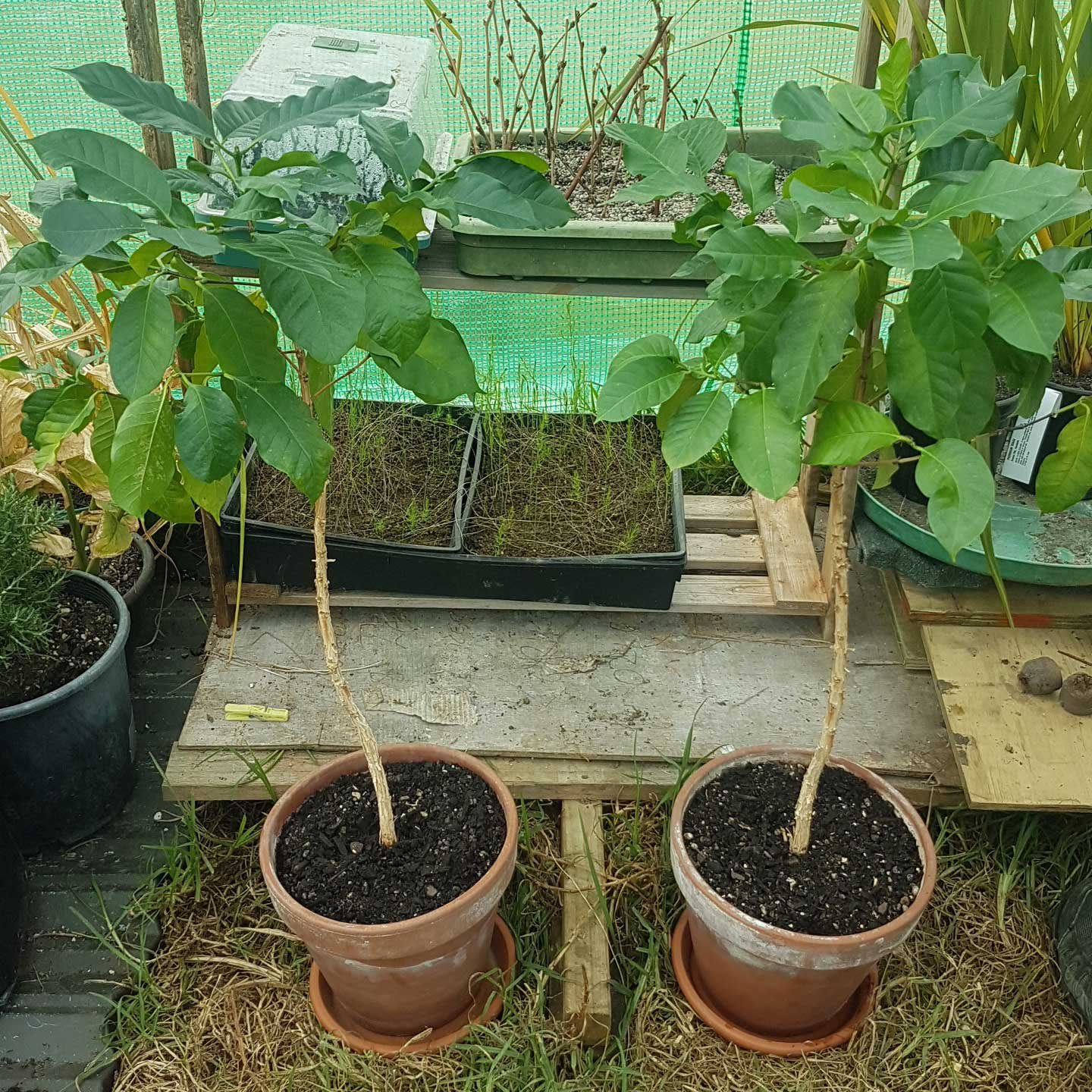
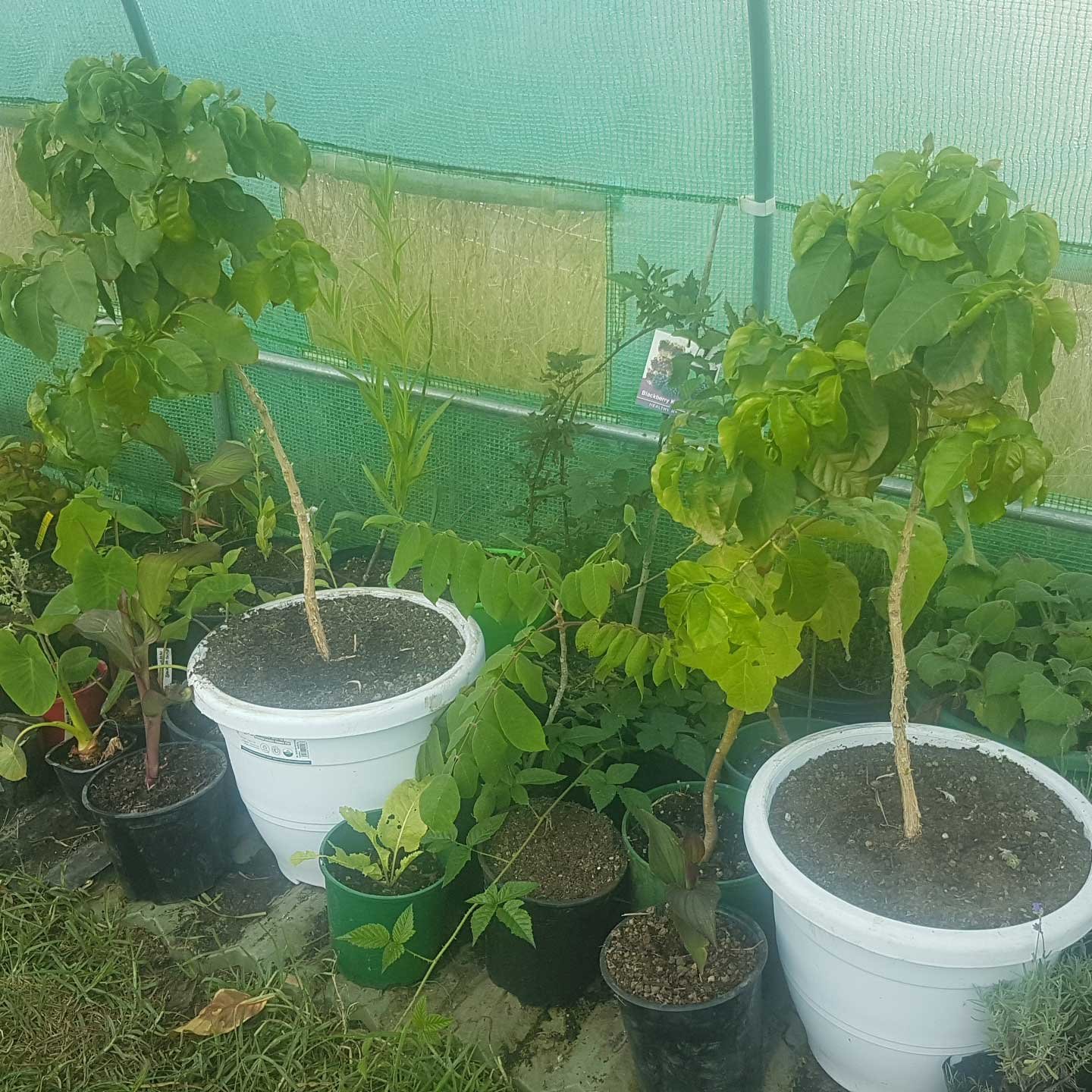
We’ve repotted them into larger plastic pots and they’ve put on a lot of growth since. These plants probably need more shade than they are getting in the polytunnel. The new leaves are smaller than the old ones, and the older leaves show signs of light stress. But it’s the best we’ve got, and they’re still growing, so I’m trying not to worry about it.
I’ll probably never get a cup of coffee from just two trees, but I should be able to propagate more when I’ve got a place to put them. There’s a coffee plantation not far from here, so there’s no reason I might not get a cup from my own coffee beans given enough time.
German Chamomile and Pennyroyal
The grass on this property causes me no shortage of frustration. There’s too much and it requires so much maintenance. Especially around buildings. So I decided last year I’d play around with planting a non-grass lawn.

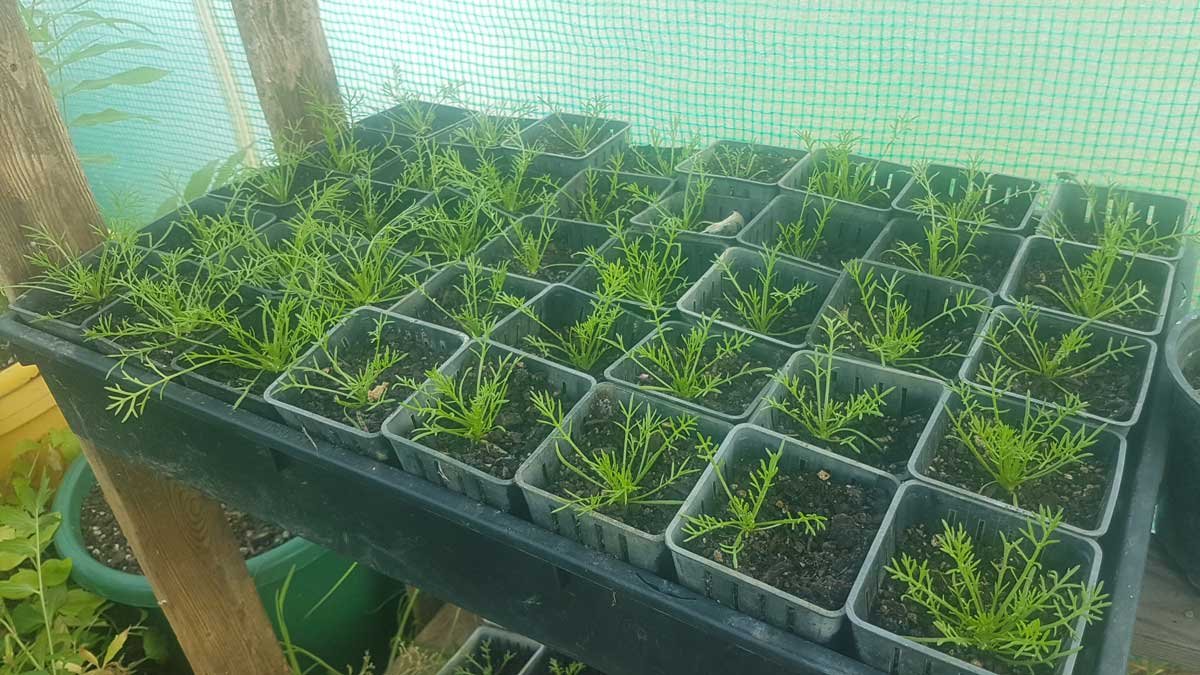
After some research, I ordered german chamomile and pennyroyal seeds from Kings Seeds, and now I have thousands of seedlings maturing and waiting to go into the ground.
I want to plant them after the rain has come back to Northland in the autumn. Hopefully by spring they’ll be ready to establish and take over as our ‘grass’. The combination of the two herbs will smell amazing as it’s walked over, and trimming should be fairly simple. I’ll likely do a longer post on this one when it’s time.
Akeake
After we purchased The Outpost, we quickly became aware that we are going to need a whole lot of wind protection. And fast.
After some research, I decided Akeake would be a pretty ideal candidate, so I purchased seeds off TradeMe.

I’ve found them to be the easiest native tree to grow, bar none. I’ve got nearly 70 seedlings planted into individual cells and nearing 15cm tall. I’m not sure yet if they’ll be going in this winter or next winter, but they’ll be early establishing wind-break species when they are planted out.
Sugarcane
I’m hoping sugarcane will be another wind-break species for us. It will also double as a stock food. Sugarcane became a plant I wanted to grow after I visited Thailand in 2017. We fed it to elephants, and I drank pure sugarcane juice that had been squeezed in front of me, and served in a ‘cup’ made from a section of bamboo.
In 2018, I purchased a few rooted-bars from a lady in Ruakaka via TradeMe. I planted most of them outside and they did ok, but they’re still at my old house. But I grew one bar in a pot on my windowsill, and it came with us here. It grew one really decent ‘cane’ last year.

A couple of months ago, I cut off that cane, cut it into pieces, and buried it in seed raising mix in a seed tray. The pieces have since rooted and shot up new canes. Now I have 4 sugarcane ‘plants’. I should be able to repeat this process infinitely to create a sugarcane hedge along one of our fence lines.
Canna edulis
This is a food that doesn’t look like a food. I call them ‘stealth foods’ and I have a minor obsession with collecting them. I picked up 4 of them via a seller on TradeMe and have them establishing in pots over the dry period.
Canna lillies are pretty ubiquitous in Northland. Plenty of farmers have a little clump somewhere near the roadside. At this time of year when they’re in flower, they look really lovely, and add some colour to your summer roadtrip.
After flowering, the spent stalks make a really great addition to the compost, so they’re pretty helpful if you’re trying to accumulate some biomass too.
But the most important thing about this particular cultivar of canna lillies is that the tuber (root) is edible. A lot like a potato.
At this point in time, I don’t have much interest in eating them. I’ll concentrate on turning my 4 plants into a patch near the gate instead. But it’ll always be nice to know we have a crop of a starchy tuber if we ever happen to need it.
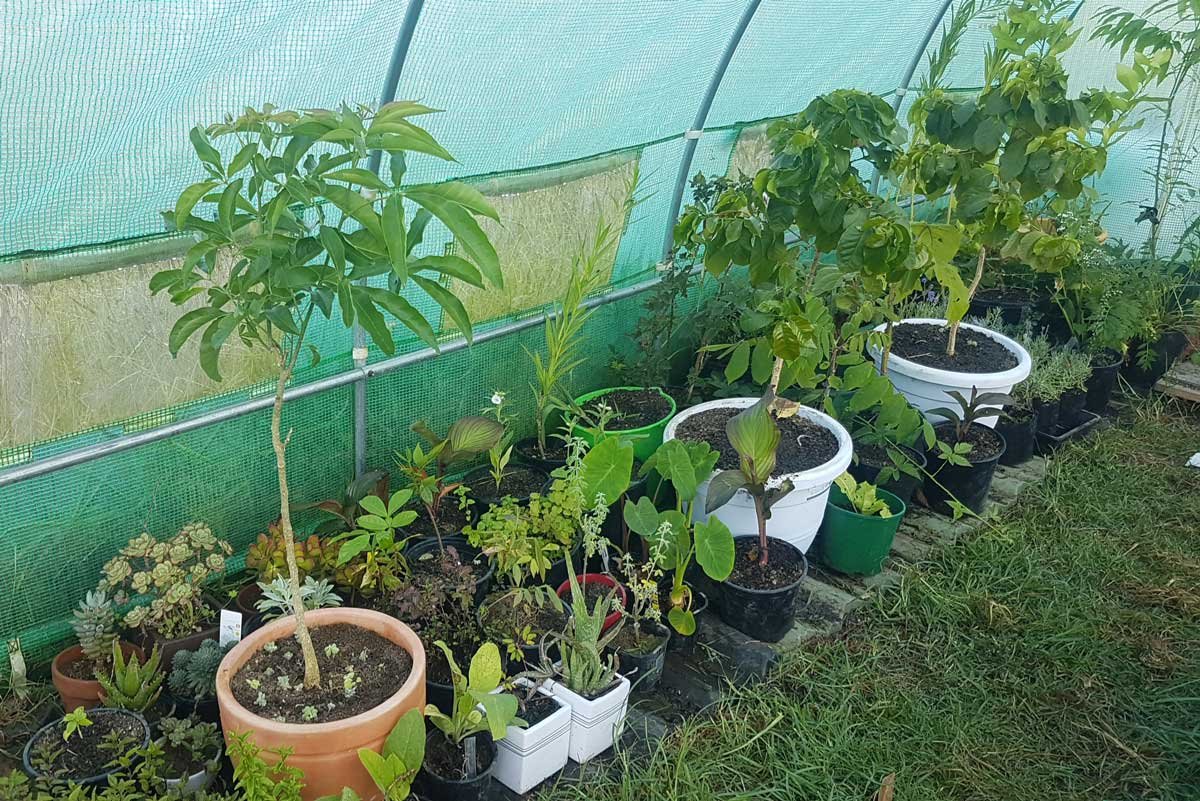
I’ve got a lot of plants still on my ‘list’ to collect – and plenty that are in my greenhouse that I haven’t talked about here today.
I like to concentrate on plants that have multiple uses where I can. And now that I have this property, I’m having fun cultivating the plants I need for this specific environment. It’s good fun, and it keeps me busy.

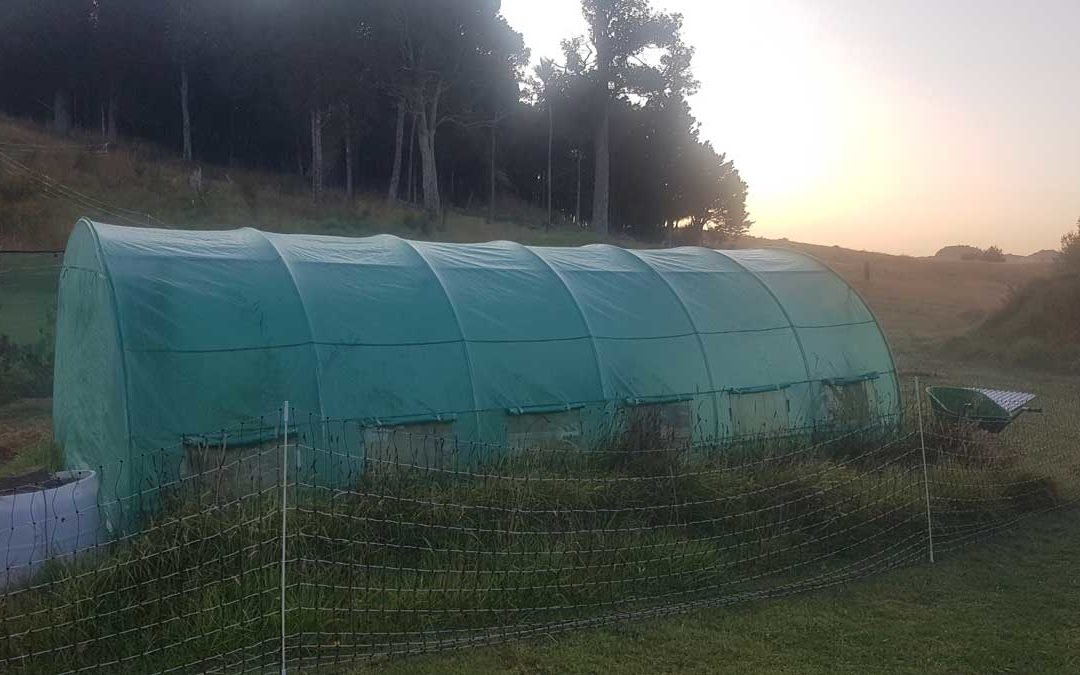

Hi Kats. I am so interested in what you guys are doing up there. Thanks for sharing what’s in your poly sheds. It’s inspiring! We bought a property with approx 500m2 poly sheds and right now we have put the whole lot under weed mat until we decide what to grow. But most of all we need time! We still have ‘proper jobs’ in the city but are (Fingers crossed) winding this down in 2020.
My new years resolution is to learn how to grow plants from seeds. My friend had a copy of a NZ gardener mag which set it out in 12 easy steps. When I say my NYR is a 12 step programme I get funny looks!
Same challenges as The Outpost – our shelter belts are old (ie dead) and about to blow over, so need replacing and weed eating around the tiny house is a frustration Might (one day when I get more time) copy your idea of planting some herbs to save weed eating every time we are out there. Thanks for the blog! Keep it up Kat!
Hi Jo! Sounds like a very different challenge to mine, but just as (if not more) challenging! I hope you’re not using Winchester weedmat from The Warehouse. We’ve used one roll here and it’s complete rubbish. The kikuyu tears it to shreds. You’d be heartbroken if you used that much of it! Growing plants from seeds is a great place to put your energy, good luck with your 12 step plan, but if you get stuck feel free to get in touch. I’m happy to try and help problem-solve 🙂 Thanks for taking the time to leave a comment!